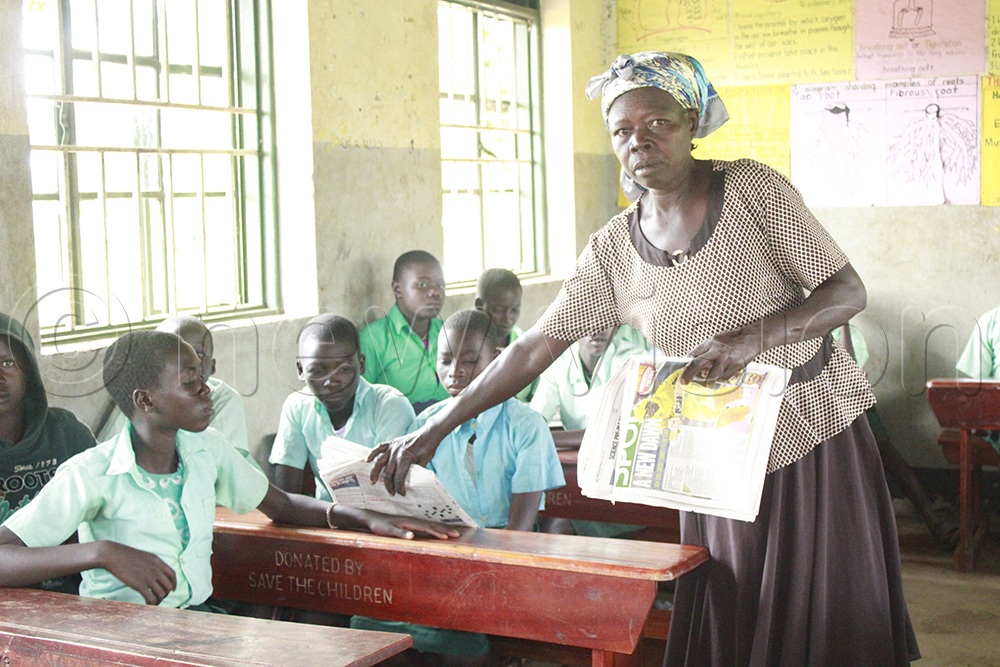Academic recommends phased retirement scheme to get teachers out of poverty
Kamusiime’s doctoral research: Public Pension Scheme Provisions and the Perceived Financial Well-being of Retiring Primary School Teachers in Uganda: A Case Study of Government-Aided Primary Schools in Wakiso District, critically examined the nexus between pension scheme provisions and the financial well-being of teachers approaching retirement.
Kamusiime (Pictured) is a Human resource analytics specialist and lecturer at Nkumba University. Four years ago, he enrolled for a Doctor of Philosophy (PhD) in business administration (human resource management) to investigate the gaps in retirement preparedness for primary school teachers and the urgent need for reform in the nation’s pension system.
Teacher Emily Lukwiya Acan, a teacher at Wii-Aceng Primary S.chool in Omoro district. Kamusiime's model helps such teachers to retire in comfort.
Only 1% of employees retire rich, 4% financially independent, 5% compelled to continue working, 12% broke, 29% deceased before retirement, and 49% retire as dependents on family and community, according to a study by educationist Bbosa Musa Mpungu.
This revelation piqued Samuel B. Kamusiime’s attention. Kamusiime is a Human resource analytics specialist and lecturer at Nkumba University. Four years ago, he enrolled for a Doctor of Philosophy (PhD) in business administration (human resource management) to investigate the gaps in retirement preparedness for primary school teachers and the urgent need for reform in the nation’s pension system.
He is set to graduate on October 25 at Nkumba University.
Kamusiime’s doctoral research: Public Pension Scheme Provisions and the Perceived Financial Well-being of Retiring Primary School Teachers in Uganda: A Case Study of Government-Aided Primary Schools in Wakiso District, critically examined the nexus between pension scheme provisions and the financial well-being of teachers approaching retirement.
Kamusiime’s study confirmed Mpungu’s patterns within the context of Uganda’s education sector.
In response, he developed the Public Pension Scheme Revamp (PPSR) Model, which is hinged on three phases including active service empowerment, transition planning and retirement sustainability.
Under active service empowerment, teachers receive continuous financial literacy and pension awareness training.
This motivates them to achieve their financial goals early. Here, they are also free to explore career opportunities or side ventures that enhance their savings capacity and reduce dependency on a pension.
In the second phase (transition planning), as retirement nears, the scheme provides tailored advisory services and simulations of post-retirement income scenarios.
Teachers who demonstrate higher readiness to change jobs are guided towards secondary careers or entrepreneurship, cushioning them from post-retirement income shocks.
Under retirement sustainability, retirees benefit from improved pension processing efficiency and optional reinvestment programs supported by the pension fund.
Institutional reforms ensure benefits are received promptly, maintaining financial stability and dignity.
On how this model will help to alleviate poverty, Kamusiime explains that it ensures timely and adequate pension disbursement, hence reducing income gaps after retirement.
It also promotes financial self-reliance through lifelong financial education and diversified income sources. Additionally, the model also enhances psychological and economic adaptability via readiness to change jobs.
Teachers can transition into alternative livelihoods before or after retirement. What’s more, there is trust and accountability in the pension system all while restoring confidence and discipline among workers.
Challenges
Kamusiime’s PhD is a big milestone, but he says it hasn’t come easy owing to challenges such as balancing work and study, limited access to relevant data and long periods of burnout. However, time management, mentorship from experienced scholars, maintaining discipline and keeping focused on the end goal saw him through.
He also thanks his family and professors Francis Kasekende and Wilson Muyinda Mande for their unwavering support.
Future prospects
Kamusiime envisions becoming a senior academic and consultant in Human Resource Management in the country. He will also mentor future scholars and influence education policy, all while contributing to national human capital development through research and leadership.
To those aspiring to pursue doctoral studies, Kamusiime advises choosing a topic you are passionate about. Also, stay consistent and organised, seek mentorship and peer support, take breaks to avoid burnout and always celebrate the small milestones along the way.